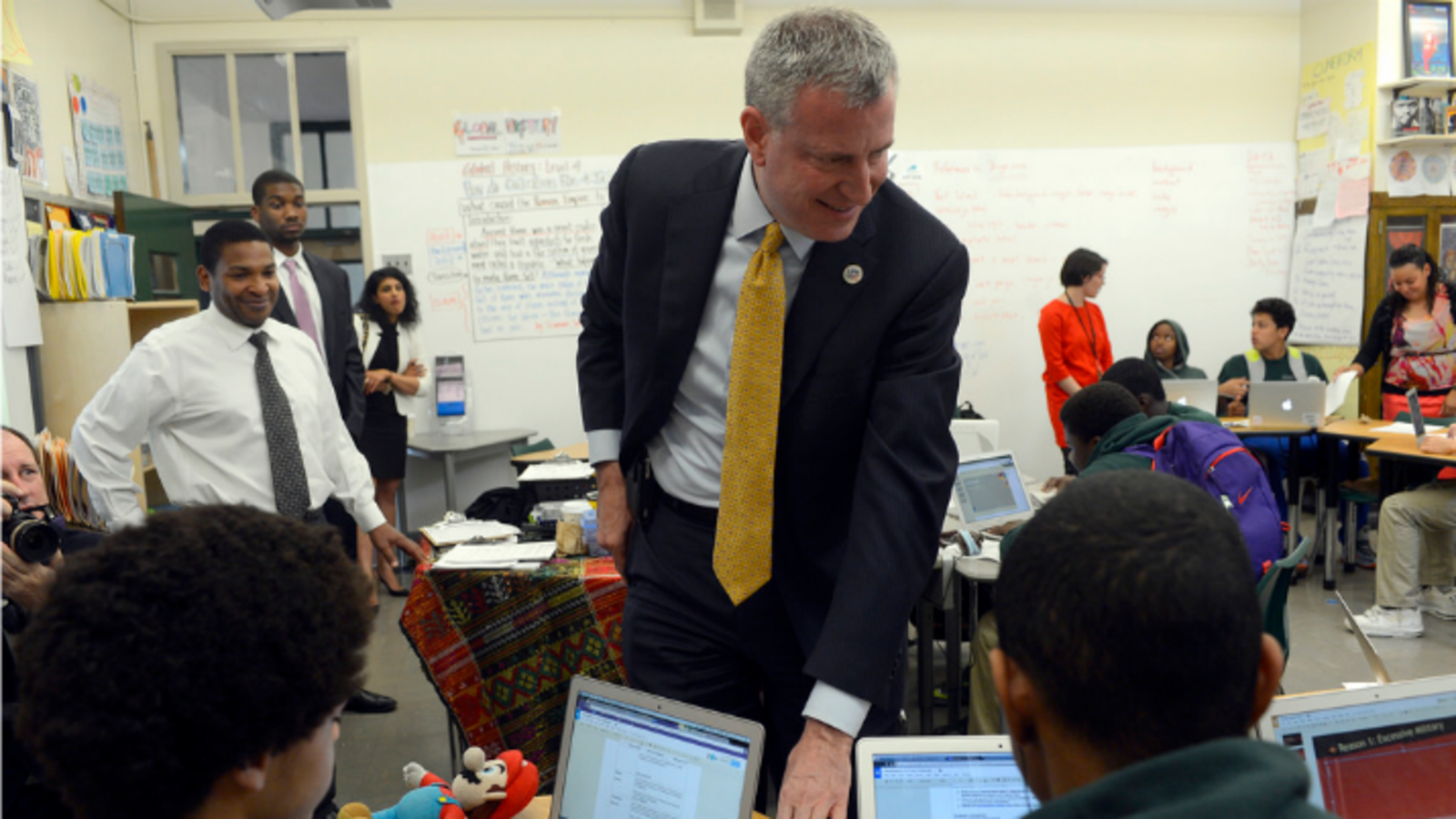Mayor Bill de Blasio visited a Bronx high school Wednesday where students learn to code and build robots to make the case that he cares about digital learning, even if he is not as tech-obsessed as his predecessor, former Mayor Michael Bloomberg.
After months of press briefings centered on his pre-kindergarten and after-school expansions, Wednesday’s event was de Blasio’s first to focus solely on the importance of technology in schools. He pointed to $20 million in his budget proposal to purchase new laptops and other classroom devices next year, and another $150 million to upgrade schools’ broadband Internet and other technology.
Other initiatives he highlighted—from coding classes for teachers to software engineering-themed schools, like the one he visited—originated under Bloomberg, who viewed tech-infused learning as a way to improve instruction and to prepare students for the modern workplace. De Blasio signaled Wednesday that he would continue those initiatives.
But he and schools Chancellor Carmen Fariña also acknowledged some challenges for their school-tech push, including the need to attract private-sector partners, to train more teachers, to “rebrand” the city’s career-training schools, and to recruit a diverse group of tech students, especially girls.
“We’re trying many, many different things,” Fariña said when asked about some of those challenges during the event at the Bronx Academy for Software Engineering, or BASE.
De Blasio said he plans to carry out a program, announced last fall, that will train 120 teachers on the basics of computer science. The city will also continue the planned expansion of a Bloomberg-era pilot program where students learn about computer programming, robotics, and web design. De Blasio also promised to open more technology-focused schools, including six-year high schools where students can earn associate’s degrees.
Many of Bloomberg’s digital learning initiatives fell under the iZone, a group of city programs that have received more than $50 million in federal, private, and city funds to spur the use of technology and personalized instruction in schools. Much of the federal money has been spent, making private-sector support more critical.
Fariña said Wednesday that she has been asking business leaders to partner with career-oriented high schools that focus on their industries. Fred Wilson, a venture capitalist who helped found BASE, emphasized that the city’s tech-education plans are dependent on funding, internships, and mentors from the tech industry.
“The city’s not going to be able to do anything on its own,” he said.
To expand the number of teachers able to help students learn computer science, Fariña said there would be new professional development, summer training, and model schools for educators to visit. To draw more students to schools that prepare students for careers in the tech sector, Fariña said the city must convince families that they are not “old-time vocational schools,” but ones that combine technical training with academics.
The city must also persuade more girls to enroll in technology-focused courses and schools, Fariña and de Blasio said. For instance, less than 15 percent of BASE students are girls. She said the city would send girls in tech programs to recruit more female applicants and would also spell out the programs’ benefits to parents.
“We need to make parents understand that this is really a major way to have a really good job,” Fariña said, “and that also, it’s kind of sexy.”
Since opening last fall, BASE has already displayed some of the promise and challenges of technology-centric learning.
Four times a year in each subject, students complete a project that requires “design thinking,” said principal Ben Grossman. In physics, students have built vehicles to demonstrate Newton’s Second Law, and in computer science, students designed webpages to promote the school to prospective students.
Grossman said the school has taken several steps to support its female students and to attract more of them. The school organizes girls-only clubs and field trips, including one to meet Michelle Peluso, CEO of the online retailer Gilt. It always includes girls when sending student ambassadors to talk at middle schools.
BASE is unscreened, which means any student can apply and those who are accepted enter with a range of abilities. To teach students at different levels, the school uses online learning activities through a city program called Digital Ready that let students move through courses at their own pace.
While the school encourages every student to attend college and tries to equip them with skills that could lead to tech-sector jobs, it also recognizes that not every student will want or be able to follow that path.
“Nothing we do is going to work 100 percent of the time,” said Wilson, the school’s co-founder. “But if we can succeed with even half of these kids, that’s a big deal.”

